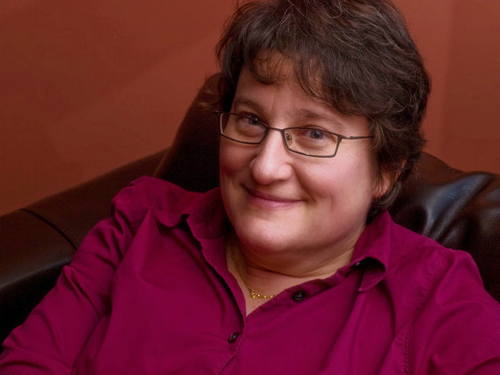
Lynne Mitchell’s first trip out of the country was a two-week field trip to Jamaica as part of a University of Guelph undergraduate course. “All it took was two weeks of discovering the different culture and the different ways of doing things in Jamaica, and I knew this was what I wanted to do,” she says. “My next trip abroad was two years in Thailand.”
Now Mitchell is channelling that love of travel, learning and cultures into her new role as international liaison officer for her alma mater. “I’ll be serving as the central ‘switchboard’ for all international activities at the University,” she explains. “We have many people here who are busy doing exciting things around the world. I will help to link faculty, staff and students to each other and to external organizations and resources. By having one person who knows about everything that’s going on, I can make connections and prevent confusion.
“If a student wants to go to Vietnam, for example, I may know which professor is planning a research trip there ─ something it might be hard for the student to find out on his or her own.”
After 18 years with the University’s Centre for International Programs, Mitchell has plenty of contacts and experience in this area and expects to take full advantage of them. “I plan to sit down with people and talk about what they are doing in more detail, so that I can start putting the puzzle pieces together at an institutional level.”
Her expertise is recognized beyond the campus. She recently completed a booklet with Wayne Myles of Queen’s University that is being distributed to colleges and universities across the province ─ “Risk Sense: Developing and Managing International Education Activities with Risk in Mind.” She also teaches regularly for the International Educators Training Program at Queen’s and has created pre-departure preparation materials used by institutions across the country.
As Mitchell explains: “All learning requires risk. Sending people to other countries can be risky, but the answer is not to cancel your international programs; the answer is to do them thoughtfully, with awareness of the risk.”
That in-depth knowledge will be essential in her new role because the number of international programs and opportunities available at Guelph is impressive. Some programs, such as those offered by the Office of Open Learning to provide training in English as a second language, bring students to U of G from other countries. Other programs provide or help to facilitate opportunities for Guelph students and faculty to cross international borders to study, conduct research, collaborate with other scholars, attended conferences, volunteer, exchange with someone from another country, “and probably more things I haven’t heard of yet,” says Mitchell.
She will keep abreast of all these programs, but that doesn’t mean she’ll be supervising or running them. Her job is to make connections, provide support and create some synergy. And she’s well-prepared for that role.
Mitchell’s undergrad degree in crop science led to a two-year stint in Thailand as a CUSO volunteer. Her work there helped her complete a master’s degree in rural extension studies. When she returned to Guelph, her experience abroad led to a part-time job in the University’s international office to work on development education.
“Each step led to another opportunity, and it was making those connections that turned a 10-hour-a-week job into my career.”
In her new role as international liaison officer, Mitchell also plans to help departments seeking to internationalize their courses. “If we get 20 per cent of our students to travel overseas, that’s a pretty good number. But that would still mean that 80 per cent are not going outside of Canada. So I think it’s important to bring an international perspective to each course taught here to give students a sense of the world.
“When our students graduate, they need to know more than physics or English. They need to know how to get along with people of different cultures and beliefs. Internationalization at home is an area of interest right now in the international education field, and I’d be pleased to work with academic units to help bring an international perspective to those students who don’t go abroad.”
Making connections within the University is a big part of the job, but Mitchell will also be required to represent Guelph as a liaison with outside organizations looking to develop partnerships with U of G. “I’ll be in good company in that most universities in Canada have an international liaison officer, and they communicate regularly through the Association of Universities and Colleges of Canada.”
Many organizations seek out the liaison officer as their first contact when looking for a partnership or information on the institution’s international activities and priorities. “I suspect my inbox is going to be filling up faster than ever,” says Mitchell, “but the possibilities are very exciting.”